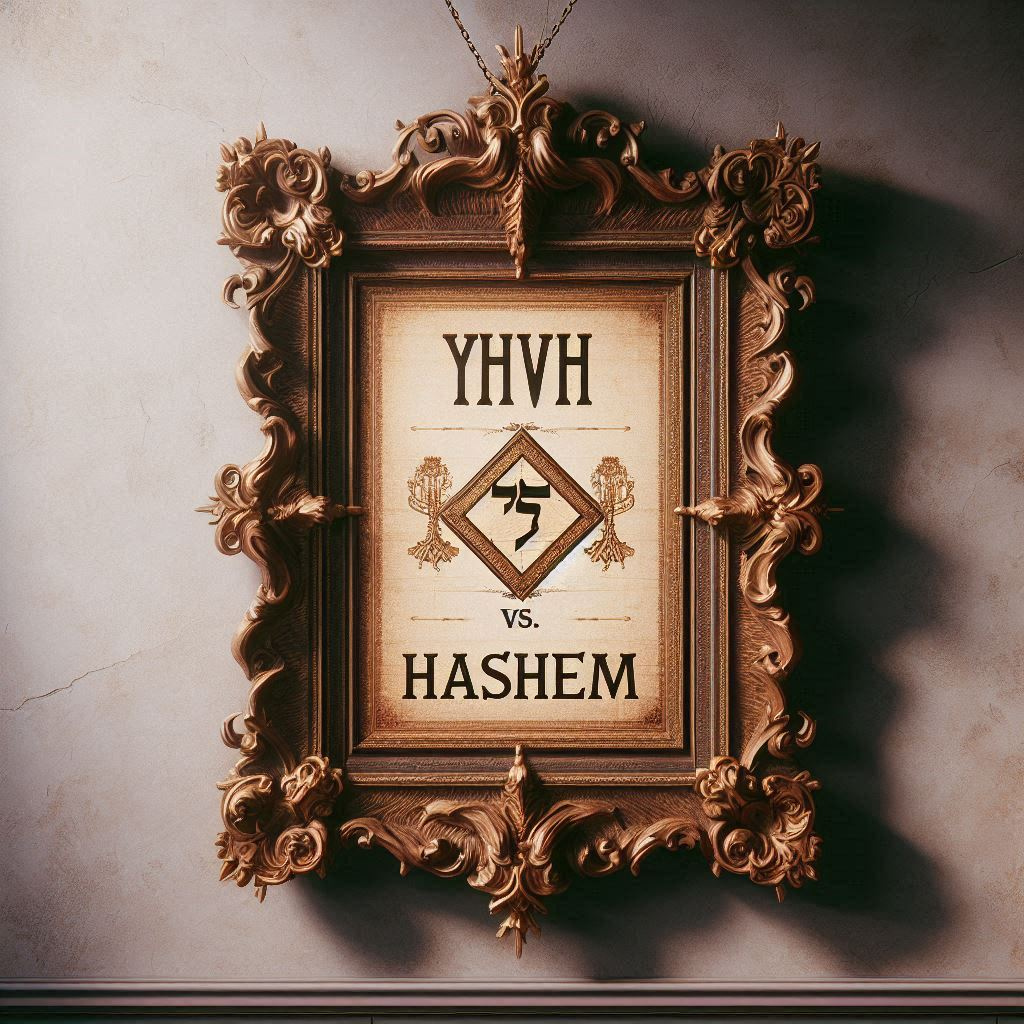The Ineffable Name Controversy: Breaking Traditions and Unveiling Truth
Introduction: In the realm of faith, the Name of Yehovah holds profound significance. However, the tradition of not uttering or writing this sacred name has sparked controversy and debate. This blog post delves into the origins, interpretations, and implications of this practice, shedding light on the true essence of the Ineffable Name.
The Tradition of Writing “G-d”: Many Jewish communities avoid writing the full name of God, opting for “G-d” instead. This practice stems from a passage in Deuteronomy, which commands the Israelites to destroy the names of non-Israelite gods. Rabbinic interpretations extended this to mean that God’s name should not be erased, leading to the tradition of writing “G-d”1.
Rabbinic Interpretations and Misinterpretations: Rabbinic authorities, such as Rashi, interpreted the prohibition against erasing God’s name as a reason to avoid writing it altogether. This led to the practice of storing or burying Jewish literature containing the name “God” once it fell into disrepair2. However, this interpretation has been contested, as the original scriptural intent was to prevent the worship of Yehovah in the manner of pagan gods3.
The True Name of Yehovah: The Father revealed His eternal and holy name to Moses, declaring it to be remembered for all generations (Exodus 3:15). Despite this, Rabbinic authorities replaced the name Yehovah with titles and descriptors like “Adonai” and “Elohim,” effectively nullifying the Torah’s instructions regarding the use of God’s name4.
The Impact of Rabbinic Regulations: By enacting regulations against using God’s name, Rabbinic authorities transgressed Yah’s eternal Torah. This has led to a widespread practice of substituting God’s name with titles, which often have pagan origins5. This practice contradicts the scriptural mandate to declare and magnify Yehovah’s name throughout the earth6.
Conclusion: As Torah-observant disciples, it is our duty to honor and proclaim the true name of Yehovah. By doing so, we fulfill the scriptural command to declare His name to all generations. Let us break free from traditions that obscure the true essence of God’s name and embrace the profound significance of Yehovah.
For those of you who would like to explore this week’s Torah Reading 13, I invite you to read and listen to the discussion entitled “Yehovah: the God Who Sees.” (Yehovah-The God Who Sees-STAR 13)
Shabbat Parah-A Foreshadow of our Perpetual Cleanness Through Yeshua Messiah
Shabbat Shalom, and welcome to Shabbat Parah. Like Shabbat Zachor last week, Shabbat Parah is neither a feast day nor a Jewish holiday. But instead, it may be viewed as somewhat of a themed Sabbath, if you will. And the theme of this Sabbath is brought forth through...
The Silver and Gold of our Service to God-Post Sabbath Thoughts and Reflections on Torah Reading 73
Shalom and Greetings, Beloved of Yehovah. I trust that you had a mighty and restful Sabbath. The Gist of Torah Reading 73 Yesterday’s Sabbath Reading discussion focused on Shabbat Zachor. If you’ve not had the opportunity to read that post, I would humbly invite and...
Shabbat Zachor 2023-Our Sabbath of Remembrance
Shabbat Shalom Beloved. Our Torah and Haftorah Reading in Light of Where we are on the Calendar This is a special Shabbat, for it is the Shabbat that immediately precedes the Jewish holiday of Purim. According to our observational calendar, Purim will occur at sundown...
The Ordination of the Levitical Priest-A Foreshadow of Good things to Come-Thoughts and Reflections on Torah Reading 66
Introduction Shabbat Shalom, beloved of Elohiym. I pray that you, your families, and your fellowships are well and blessed on this blessed day of rest in Yeshua Messiah. This is “The Ordination of the Levitical Priests: A Foreshadow of Good Things to Come.” It will...
The Renewed Covenant Spiritual Application of the Levitical Priestly Garments-Thoughts and Reflections on Torah Reading 65
Introducing Torah Reading 65 This week’s Torah Reading is the 65th reading in our 3-year cycle. It is contained in Exodus 27:20-28:43. I’ve chosen to entitle this synopsis of the reading: The Renewed Covenant Spiritual Application of the Levitical Priestly Garments....
The Connection Between Giving and God Dwelling with His People-Thoughts and Reflections on Torah Reading 63
Shabbat Shalom! Warm greetings to you, dear Saint. We hope, trust, and pray that this post finds you, your families, and your fellowships well and blessed on this bitterly cold Sabbath amid Hanukkah 2022. Our Torah Reading Have you ever considered the reality of a...
The Book of the Covenant-What it Means to Modern Day Believers-Thoughts and Reflections on Torah Reading 62
Our Torah Reading this Shabbat features the covenant Yah established between Him and Yisra’el at Sinai. It is the 62nd Torah Reading of our 3-year Torah Reading Cycle. Our reading is contained in Exodus/Shemot 24:1-18. This is the next iteration of Yehovah’s...
God Prohibits His People from Badmouthing Government Leaders—Thoughts and Reflections on Torah Reading 61
Shabbat Shalom beloved. In this Thoughts and Reflections of Torah Reading 61, we will examine a number of themes and concepts that fall within the realm of loving Yah and loving one’s neighbor as one would love themselves. I’ve taken the liberty of breaking this...
Dealing with Difficult Relationships-Thoughts and Reflections on Torah Reading 60
Shabbat Shalom saints of the Most High. May you, your families, and your fellowships be well and blessed in the perilous times we’re living. Central Themes and Life Lessons of Torah Reading 60 I’ve entitled this reading study: Dealing with Difficult...
The Fox in the Hen House–The LGBTQ Infiltration of Judeo-Christianity
Shalom beloved. I pray that this installment of The Messianic Torah Observer Journal finds you, your families, and your fellowships well and blessed. They Say that Curiosity Kills the Cat True to form, Hilary and I canvassed portions of YouTube to augment our worship...

